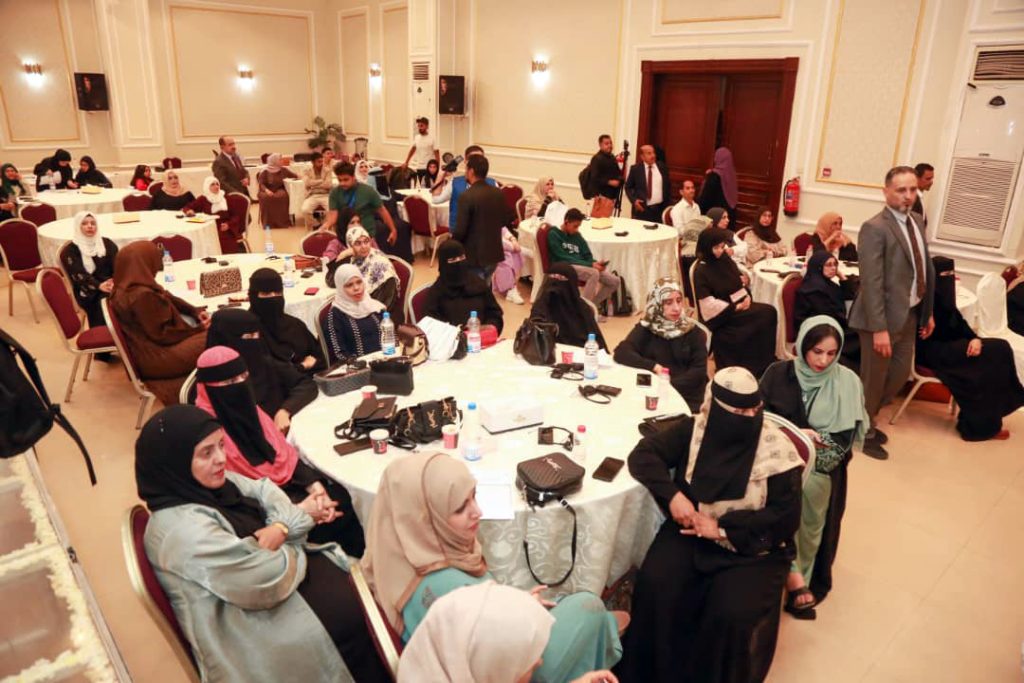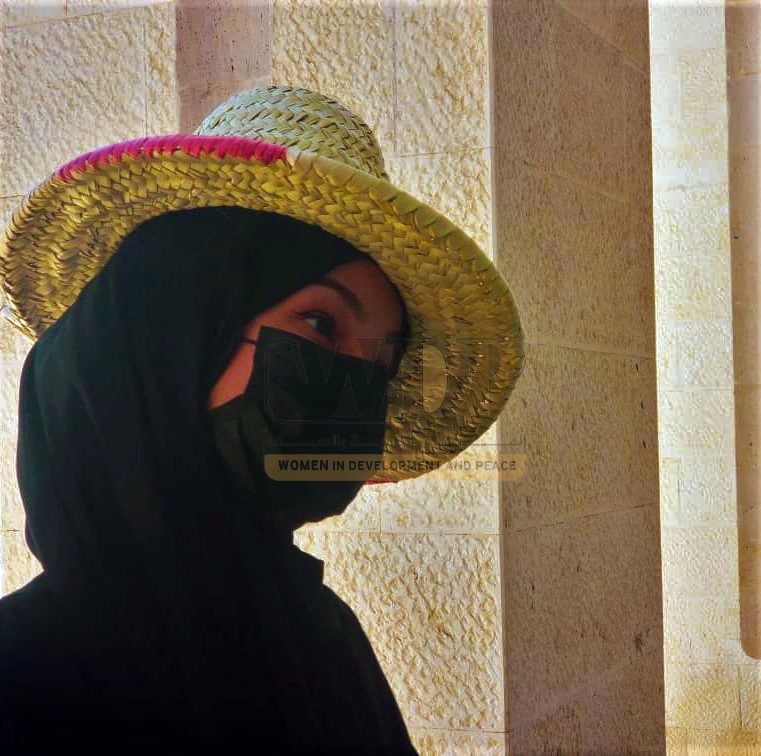Women in Development and Peace – Yasmine Abdulhafeez
Muna Ahmad (pseudonym) has been working in the field of wedding photography since her graduation in 2016. She did not find the media institutions she aspired to work for, hoping to work in documentary program production and television photography. However, the conflict and its effects forced many in this field to work in areas other than those they desired.
Muna is the sister of three brothers, her father is disabled, and her mother is elderly. She managed to balance her work and her role at home, especially since she had to take on many household tasks: cooking, cleaning, shopping for the family’s needs, including her father’s requests, especially since her brothers work in another governorate.
Muna says, “My mother can no longer work; she has aged, and this has greatly increased my suffering. She used to help me with multiple tasks, and I now bear a lot of the household chores, in addition to my work in photography, printing photos, and preparing them for clients on time.”
She adds, “My mother suffers from joint pain, a condition that has been with her for years, and her old age has further deteriorated her health, in addition to my father’s disability. I work to serve and assist them, ensuring they do not feel embarrassed, burdened, or in need.”
She continues, “I have prepared a work schedule to manage my tasks at home and work, allocating time for each task. I have succeeded in overcoming all the obstacles and challenges I face in completing my professional and family duties. In order for a working woman to succeed in any field, she must balance her job and her role at home, to avoid any shortcomings on either side.”
Many families in Yemen rely on women to perform many household tasks, even if they have domestic workers who handle some chores, such as cleaning dishes, house stairs, and doing laundry. However, the task of cooking cannot be replaced, and the family relies on the housewife to prepare the food, even if she is employed and does not have enough time.
Therefore, Yemeni working women are keen to balance their job and their household duties, naturally accustomed to dividing their work on both sides – family and professional – without relying on the presence of a maid to help reduce their domestic role, including women working in the media field.
Abeer Ali, a journalist, says, “The role of the media lies in not burdening it with things beyond its capabilities, and in recognizing its need for rest; such as times when it faces family pressures beyond its control.”
She adds, “Men should assist women in organizing their lives and sharing responsibilities and tasks, as both are factors that require mutual participation to alleviate pressure. Women should also be involved in childcare responsibilities, which are often left to women alone, and their workload should be considered in case of work pressure.”
Society’s culture agrees that women must work in their homes, even if they hold high-ranking positions and work long hours, especially in societies where women cannot easily delegate some household tasks.
There are many family circumstances that, if a woman cannot resolve, will lead to many women, especially those working in the media field, leaving their jobs. These women play important roles in various media outlets; they are presenters, directors, photographers, editors, correspondents, journalists, program producers, and planners.
The media field is often seen by many in society as stealing women’s time, leaving them with insufficient time for their families, spouses, and children. However, women have proven capable of managing their time without harming any aspect, whether professional or familial.

Extent of Compatibility of Women’s Professions with Their Family Lives
Rana Al-Habashi, a journalist, tells Women in Development and Peace newspaper how she balances her work in the field of photography with her family role. She says, “My work initially started with photographing weddings, as these events in Al-Hodeidah usually take place after sunset. Our lives in Yemen usually involve finishing most of our household chores by the evening.”
Rana continues, “I make sure to finish my household tasks by the afternoon, then I prepare for work, which starts right after evening prayers, and then I head out to work. If I have a morning photo shoot, such as graduation ceremonies, conferences, or other events, I ensure that our breakfast is a ready-made meal, and as for tidying up the house, it is relatively clean, especially at the beginning of the day, and then I head out to work.”
She adds, “Sometimes, my work requires me to stay at work until after noon. At that time, I call my mother and inform her that I will be late, so my mother prepares lunch, and when I return, I complete the rest of the tasks. Most household chores usually take place at noon, especially preparing lunch, washing the dishes, and cleaning the house.”
Rana says that she faces many difficulties when she has more than one photography assignment, especially in the morning and evening. She tries to bear the work pressure as she is the only girl in the house, and she has to do all the household chores in addition to her work in photography.
Another journalist (who requested not to be named) says, “A working woman in the media field succeeds in her work if she is in a relationship with a man who works in the same field. He will understand the nature of her work, comprehend her busyness, and of course, help her balance her work as a journalist with her family duties.”
She emphasizes, “Harmony and understanding between spouses help them to succeed together and assist each other. This is also important for a woman’s success in her work, including in the media field.”
She believes that the family plays a significant role in assisting employed women in such families, especially if they are in fields not tied to specific working hours, such as some media fields.
She explains, “Without the help of my sisters, mother, and their assistance with my household tasks, I would not have been able to accomplish many tasks and duties, including taking care of my children and attending to them while I am traveling or occupied with some work.”
Examples of Women in the Media Industry
Many Yemeni female journalists have distinguished themselves with creativity and excellence in their performance. They have proven their ability to engage in media work in a conservative society that believes a woman’s place is in her home, serving her family.
There are numerous examples of Yemeni women in the media who have represented Yemen in the best light and have had an honorable presence in various Yemeni media outlets, whether print, visual, or audio.
Maha Al-Buraihi is one of the most famous Yemeni female journalists. She is a mother of three children – two sons and a daughter. She graduated from Sana’a University, Faculty of Arts, Department of Media. She has worked in various media roles, including as the manager of women and children’s programs at the former Yemen channel, and as the general manager of the women’s department at the Public Corporation for Radio and Television. Maha Al-Buraihi was born in the governorate of Ibb in 1975, received her education in the city of Al-Hodeidah, and presented children’s programs on Al-Hodeidah Radio before moving to the capital Sana’a to pursue radio work in 1990 and television work in 1991.
She has presented numerous television and radio programs, including “Natural Reserves,” “The Other Face,” ” Hawa’s World,” “On the Path of Democracy,” “Echo of Words,” “Quotes in Love of the Homeland,” “Arab Session,” “Yemeni Islands,” and “Joint Arab Evening – Yemen and Syria,” among many others.
She has also participated in several Arab festivals and events, including the Arab Pioneers and Creators Festival in Amman, Jordan in 2009, the Ninth Cairo Festival for Radio and Television in 2007, the Salalah Autumn Festival in 2000, and the Second Conference for Arab Women in Amman, Jordan in 2002.
Hadeel Al-Yamani, a Yemeni journalist, has made a prominent name for herself in the field of field reporting, despite the difficulties faced by female workers in this field. In a society where the presence of women as field correspondents is seen as a threat and where it is preferred for this role to be held by men. Hadeel Al-Yamani was born in Al-Qabita directorate in Taiz governorate in 1991. She studied at the Faculty of Media at Sana’a University, coming from an educated family background – her mother is a teacher and her father is an educational researcher. She is known for her simplicity, lack of affectation, and her courageous engagement in fieldwork.
I worked at Yemen Shabab channel, where I hosted a program called “Amidst the Crowd,” a cultural and social program that featured many stories of Yemeni creators and showcased the customs and traditions of the country through its various segments. Later, I moved to work as a field correspondent at Al-Jazeera channel.
In an interview, Hadeel said, “The decision to join Al-Jazeera television network came as a surprise. I was nominated along with many other girls and was chosen based on the criteria and conditions. My first report was about cancer patients in Yemen.”
Nadia Hazza’, a well-known Yemeni media personality, worked in the field of television directing and is a mother of five children – three daughters and two sons. She was born in the city of Aden in 1959 and was the first Yemeni woman to hold the position of Director General of Programs at Aden Satellite Channel.
Her notable works include the field program “Knights of the Field” presented by Yahya Alaw, which was broadcast during the holy month of Ramadan, as well as the programs “Echo of Verses,” “Race of the Firsts,” variety program “Roam and See”, “Cocktail” program, and other distinguished programs.
Nadia Hazza’ said in an interview with a Yemeni media outlet, “Being in a relationship with a man working in the same field made it easier for me to overcome many difficulties. With his help, I managed to balance my work and family life, and achieved the success I aspired to.”

